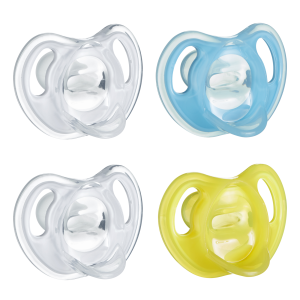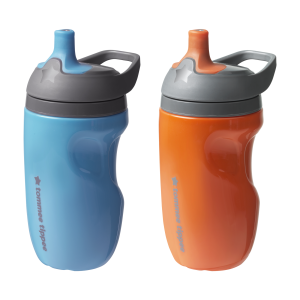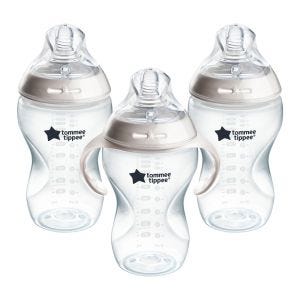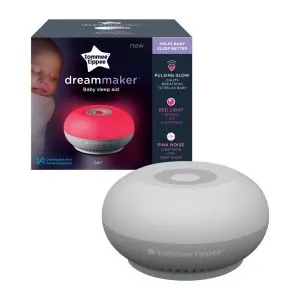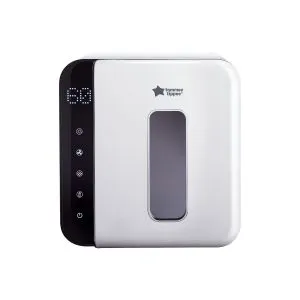
Tommee Tipps
If you’re planning on breastfeeding your newborn or have already started your breastfeeding journey, you might have some questions about some of the tall tales you’ve heard through the months.
Breast Milk Myths: True or False?
When you’re pregnant, you’re unfortunately subjected to a few common annoyances – back pain, food cravings and people telling you what and what not to do. You’ll hear opinions that you didn’t ask for and horror stories that no expecting Mum should have to hear.
If you’re planning on breastfeeding your newborn or have already started your breastfeeding journey, you might have some questions about some of the tall tales you’ve heard through the months. Some common misconceptions are widely spread and delivered to you by people you trust, so it’s totally natural that you would have believed them. We want to make sure that, if you’re hearing myths and misconceptions about breastfeeding, you have all the facts to set you straight.
Here are five common breast milk myths, debunked…
1. You have to have big boobs to produce a lot of milk
Listen, it’s totally natural for a new mum to worry about how much milk they’re producing for their little one. But your baby doesn’t care if you’re an A cup or a triple H – the amount of milk you produce has nothing to do with your breast size.
Breasts are largely made up of fatty tissue, so the more you have, the bigger your breasts will be. But this fatty tissue truly has nothing to do with milk production. Your ability to produce milk comes from your glandular tissue. When your baby suckles, the action triggers your mammary glands to produce milk – so the more you breastfeed or express for your little one, the more milk you’ll make (supply and demand). Nothing to do with size, see.
The only thing that size could count towards is storage capabilities. If your boob were a cup, smaller boobs will hold less milk than larger. But this could just mean you may need to breastfeed or express more often during the day if you have smaller breasts. You’ll still produce the same amount of milk.
2. Breastfeeding keeps baby away from partners
Some parents might prefer to bottle feed so that partners and other family members can have more time with their babies, and feeding isn’t just a job for Mum. That’s totally fine - but breastfeeding doesn’t mean that partners and family members are kept away from the newest addition to the family.
There are plenty of ways for partners to bond with their newborn without being involved with feeding. Breastfeeding takes its time but there’s still a huge chunk of the day where baby’s family can have some quality time. Making time for cuddles, singing and talking to their little one is a great way to bond without feeding. And there’s always the trusty skin-to-skin contact for that extra sprinkle of connection.
Plus, if you’re planning on expressing and storing your milk, you can always give your partner a bottle or two (the 3am ones!!) so they can feed their baby just as much as you.
3. It’s normal for breastfeeding to hurt
A lot of breastfeeding mums report painful breastfeeding experiences, especially early on in their journey, but breastfeeding in general shouldn’t be painful. The reason for the pain that some mums experience could come down to improper latching or tongue-ties among other explanations. If you’re worried about painful breastfeeding or if you’re experiencing pain, chances are that there’s a solid explanation and hopefully a fix.
A very common explanation for pain is improper latching. If your baby is latched correctly, the nipple should go deep into the baby’s mouth and their tongue should do most of the work getting out the milk. If your nipple isn’t positioned correctly, your baby’s tongue might press up against your nipple and could cause pressure and sore nipples.
If everything is operating smoothly, breastfeeding should be a pain-free process. Maybe a little uncomfy or weird at first, but certainly manageable. If you are experiencing or worried about pain, you should chat to your midwife or doctor.
4. Nipple shape matters
If you’re looking down and thinking ‘there’s no way that’s going in my baby’s mouth’, you’re not alone. Many new mums worry about the size and shape of their nipples and wonder if they’ll run into issues. This could be down to inverted nipples, large nipples, flat nipples etc. But rest assured, your baby is resourceful and resilient… they’ll manage.
When your baby is feeding, they don’t latch on to the nipple alone - they latch onto your areola too. So as long as they get a good mouthful of breast, you don’t need to worry about how much your nipple sticks out. Flat or inverted nipples might give your baby some trouble with their first few latches, but they’re likely to get used it with time and practice. Plus, your nipples are likely to stick out a little more throughout your breastfeeding journey.
If you’re worried that your nipples might be too large for your baby, there are plenty of tricks and techniques you can try that could help. A nipple shield can make it easier for little ones to latch on, as well as protecting your nipples from becoming sore. You can also hand express your breast milk before your little one gets to it, that way your breasts will ease and your baby may be able to get some areola as well as nipple.
5. You can only eat bland food when you’re breastfeeding
We get it, when you eat a really hot curry there’s a little voice inside your head that tells you your breastmilk is going to come out spicy. But don’t worry, by the time your food is digested into milk, anything that could upset your little ones stomach will have broken down. It could have a little tang of last nights meal, but nothing that should hurt your baby.
As always, you should stick to a healthy and balanced diet, for your benefit as much as your baby’s. Nutrients can pass through to your milk and get to your little one, so it’s best to eat as healthy as you can. But healthy doesn’t mean bland! You can still have a variety of meals and snack to your hearts content, just ensure you’re getting enough fruit and veg, protein, fibre and all that other good stuff. If you notice certain foods upsetting your little ones stomach, try and avoid them for a couple of days and see if it makes a difference – it could just be a wait and see situation.
Alcohol and caffeine are the two biggies to keep in mind while you’re breastfeeding, but you don’t have to cut them out totally. You can probably have one alcoholic drink per day, at least two hours before you plan to breastfeed, as well as limiting yourself to around two cups of coffee per day… not so bad.
It’s totally normal to worry about breastfeeding as you’re starting your journey. But just keep in mind that not everything you hear is true and sometimes you just need to play it by ear and see what works best for you. We’re not saying that breastfeeding is going to be a breeze, it comes with it’s challenges and you have to work through them to find the right feeding solution for your baby. Your journey is unique to you and your little family.

